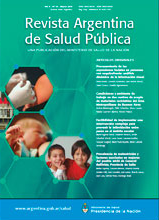Self-esteem and social skills in children from Greater San Miguel de Tucuman, Argentina
Keywords:
Self-esteem, Social Skills, ChildrenAbstract
INTRODUCTION: Self-esteem is strongly associated with social skills, since effective interactions influence self-image. The objective was to analyze the relationship between self-esteem and social skills in children from 9 to 11 years old attending public schools in Greater San Miguel de Tucuman, considering age, sex, place of residence and family group. METHODS: A descriptive-correlational study was conducted using a non-probabilistic intentional sampling. A total of 193 children participated, who were administrated a self-esteem scale, a social skills scale and a sociodemographic survey. RESULTS: The perception of low self-esteem was 23% and 16% in family and social fields respectively. Only a weak statistical association was found between general satisfaction perceived and assertive style (r = 0,148, p = 0,04). Children with high self-esteem used both assertive and inhibited styles. Multiple regression analyses showed the relationship between age and social self-esteem, while sex, place of residence and family group were associated with social skills styles. DISCUSSION: No relationship was found between self-esteem and social skills styles, although personal and contextual aspects were associated with these multidimensional variables. Further studies are needed to identify levels of self-esteem in childhood, in order to increase it and reduce the psychopathological risk.
Downloads
Downloads
Published
How to Cite
Issue
Section
License
Copyright (c) 2020 Revista Argentina de Salud Pública

This work is licensed under a Creative Commons Attribution-NonCommercial-ShareAlike 4.0 International License.


